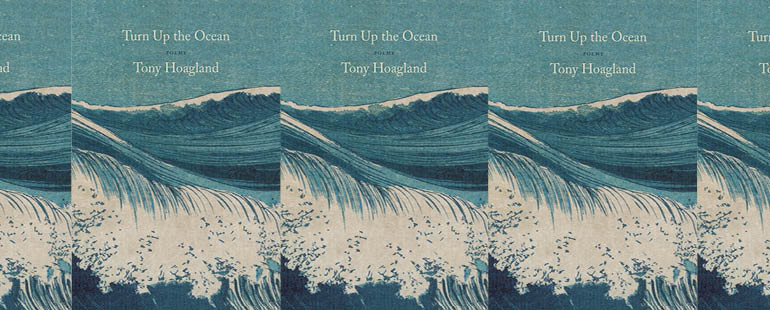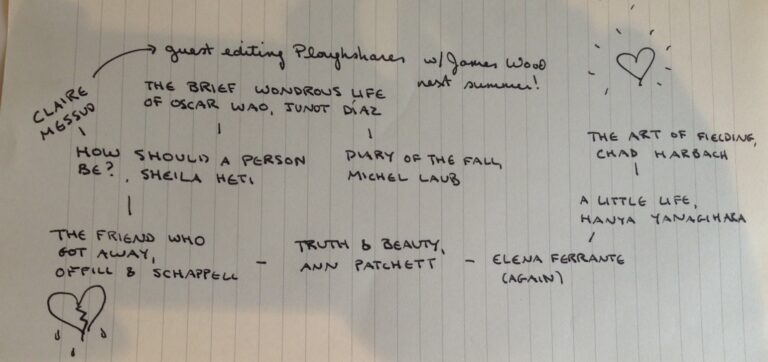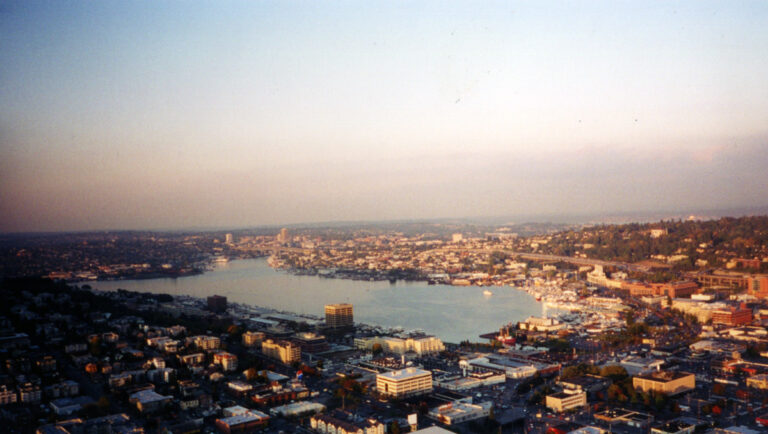Opus Posthumous

At the end of Turn Up the Ocean, the posthumously published volume from poet Tony Hoagland out earlier this year, following several distinct arrangements of sentences into lines, and the patterning of time through these arrangements, there is an afterword: Kathleen Lee, Santa Fe, New Mexico, July 2021—signed three years after Hoagland’s death in October 2018 from pancreatic cancer. In her afterword, Lee remembers conversations with Hoagland, a Ploughshares guest editor and many-time contributor, about the formation of this volume, anticipating “its shifting contents” and endless revisions collaborating into and through the future, after his life would end. Hoagland was “aware that [Lee] would be the one to finish the book.” He had, at first, conceived of Turn Up the Ocean as a slimmer project, or “what he imagined as a chapbook…his final collection.” In the spring of 2020, though, at home during the start of the COVID-19 pandemic, Lee assembled what would it become:
In my expeditions through his drafts, I also discovered poems the had overlooked or forgotten that fit well into the more expansive collection that is this book. Tony revised his manuscripts almost as much as he revised poems; he felt that any version might be good enough, but none exactly right. No doubt he would want to make changes to some of these poems and to this published version of Turn Up the Ocean.
The possibility of forgetting poems, a momentary oversight willed into the volume and its assembling, moves through the quality of “good enough, but none exactly right.” Right can never be the goal. “Right or wrong” is not the way to talk about poems. The figure of exclusion, however, completes something made—none more so than the final work assembled by the poet who knows that it will be their final work. Readers cannot know what is not on the page. In the first poem of this volume, “Bible All Out of Order,” Hoagland writes, “I’m sometimes afraid that’s what I’ve done with my life,” immediately conceding to this impossible knowledge. What one will do—has done—with their life, how a life will be remembered, how a volume of poems or the work completed throughout a lifetime once was, will turn out, will be received—all of these are unknowable.
In her afterword, Lee imagines Hoagland’s reaction to the published version of Turn Up the Ocean: “Possibly a few of the newer poems that I chose to add he would have considered not yet polished enough for a book. But to my mind, the roughness of these poems lends them their luminous intensity.” Another way to understand the phrase “luminous intensity”: the roughness of these poems lends them their bravado—self-recognition of process, the intimate recoiling from their own making.
Listen to these lines from “Disclosure Agreement”:
Before I came to work on this planet
I signed a nondisclosure agreement with god
that I would not publicly discuss
what goes on around this place
Here god is real, and so is an inhabitable place that is not this planet; the scene looks a bit like a meeting with human resources. A potential homily from Hoagland adopts the tone of watercooler gossip. Elsewhere things happen that cannot be publicly discussed, yet like an agreement to disclose language, the discourse of a poem happens privately, between the agreed upon parties—between the poem and its few readers, across time, between the poem and the poet, between the poem and itself:
—the cockroaches in the waiting room, for example;
that most angels have bad breath;
the low statistic success rate
of the surgery for transplanting souls.
It becomes clear that “this place” refers to a transactional heaven, a doctor’s office where a waiting room is necessary, where the insurance cards have been misplaced and a doctor fails to transplant the soul—into what? At what cost? Being dead or non-human looks a lot like being alive—“I have plenty to tell the tabloids if they ever show up: / about the nasty infection called ‘achieving success’”—where achieving success pays the insurance debt. Being dead or non-human looks a lot like being alive, because how could a poet know otherwise? Work, too, is interplanetary here, in characteristic Hoagland ruffled bemusement: the person speaking the poem does not tell us his profession, the kind of work he does: “I promise—I’m going to work hard, / but I’m not telling anyone what I see in the future, / nor where I plan to go after this.”
“Disclosure Agreement” ends with these two lines: “and I won’t give anyone my true name even when asked, / and I’m not going to sign anything ever again.” Lines like these scattered throughout Turn Up the Ocean remind me of the volume’s “roughness”—the way they collect the emotional imperative of the poem into almost analytic rhetoric in context, more a conclusion statement than the ending of a poem. Yet the volume’s “roughness” becomes a kind of vulnerability, too—a stylistic forwardness with which Hoagland has not commonly been associated.
In “Among the Intellectuals,” a young man tries to join the exclusionary and privileged club, so to speak—the “restless tribe” that “[torments] and [arouses] thinking into strange behaviors.” The young man works toward acceptance from those whose thinking, and the tangible representations of their thinking, he respects: “I was young and I wanted to prove myself, // but the words I learned from them transmuted me. / By the time I noticed, the change had already occurred.” The poem places so much emphasis on but—the single-line stanza ends, transitioning back into couplets—rather than the possibly self-affirming and. The young man does not want to be changed in this manner; to notice this change happen in real time is “tormenting,” a bit like “talking to yourself.” What good is thought, the act of thinking, if the “thought-provoking activity” becomes masturbatory—if it does not extend beyond oneself? The poem needs a reader, someone for whom these sentences and lines make an experience in time, in the present.
The final poem of the volume, “Peaceful Transition,” describes simple actions: a man looks out at his neighbor’s trash bins, he reads a book, he “thinks of buffalo on Divisadero Street / of the Golden Gate Bridge overgrown in a tangle of vines”—all while retroactively defining the labor he performed on earth: “It is important that we expire. / It is a kind of work we have begun in order to complete.” Like the strategic assembling of a volume that never becomes quite right, the work cannot be completed, only abandoned. The book he reads is titled The End of the Ascent of Man, the poem summarizing “it says the time of human dominion is done.” The titular transition is not a singular movement, the surgical maneuver of the self, but one of “human dominion,” our own mortality. Just as it is important that we expire, it is likewise important that this knowledge stays impossible. Whether it’s true that the time of human dominion is done does not quite matter for the poem—”right and wrong,” in this case, gets us nowhere—but it matters greatly that one recognizes its finitude, our mortality. “I’m not telling anyone what I see in the future,” Hoagland writes, because the act of withholding and the knowledge that something is being withheld provokes a feeling greater than certainty.
“I like the hospital for the way it grants permission for pathos” is a line from a poem titled “Why I Like the Hospital.” Does the poem explain why this person likes the hospital? Does the poem explain how this person has come to like hospitals? Throughout his career, Hoagland developed a method for wryly transposing the mundane—if not grim—features of life into objects and events worth reexamining: through irony, through affection, through love, through a panicked anticipation of the future. Throughout his career. What can be said about a career, a lifetime? No one controls how their work will be remembered; no one controls how they will be remembered. The poem, as an experience that happens in time, is an experience of our own mortality. The sound machine that can play “Thunderstorm or Forest Pines or Sonorous Ocean” sits on the nightstand: “It soothes me in the night to hear the waves / sweeping over the beach again and again, / and the blue-gray background screech of the gulls.” You see the sound machine on the nightstand, then you see the blue-gray background of the beach, the seagulls. The imperative to turn up the ocean is simply a matter of reaching over yourself to press the volume button.


